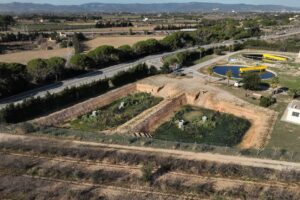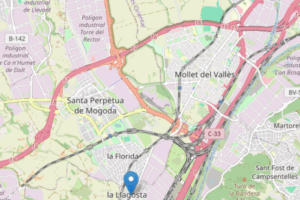
Completion of the MOFRICON: an optimisation system for industrial cold generation plants
February 5, 2021
Improved efficiency in pest control through photonic technology
February 16, 2021The Institute of Energy Technologies (INTE) is working on the TraceRadon project to study how to improve the quality of measurements of radon gas in air and soil, to better control their impact on health and the environment.
Radon is a natural gas that comes from the radioactive decay of uranium that is present in rocks and soil. It is the main source of exposure of the population to natural radiation. Radon is also used to locate, trace and quantify the source of greenhouse gas (GHG) emissions through the Radon Tracer Method (RTM) and models of atmospheric dispersion. Currently, there are no tools to measure this gas in low concentration in the air nor to measure radon exhalation from the soil correctly.

The TraceRadon project will provide new sources of measurement, more sensitive reference instruments and effective methodologies to quantify the concentration of radon gas in the air and radon exhalation from the soil, which are also required to validate models of flows of radon in Europe.
This technology will be used to standardise instruments and validate models of the flow of radon, which will be compared with other models and through intense field campaigns. New radon gas detectors that are constructed as part of the project will be tested with various field measurements in Germany, Italy, France and England. The tools and instruments developed in the area of the project will be made available to atmospheric control networks such as the Integrated Carbon Observation System (ICOS) and networks of environmental radioactivity control.
The project is part of the EMPIR programme that is cofunded as part of the European Union’s Horizon 2020 programme, with a budget of 2.4 million euros. The project is expected to take until 2023. Other participants in addition to the UPC are the University of Cantabria and a further 16 institutions and research centres at European universities in Germany, Poland, Hungary, Sweden, Austria, Czech Republic, France, United Kingdom, Serbia, Romania and Italy.
Technology
You want to know more?
Related Projects
- A research team from the UPC, in collaboration with the company B. Braun Surgical, has created a ceramic and biocompatible catalyst that captures greenhouse gases and transforms them into useful chemical products in a more sustainable way and at a lower cost than current technologies. The technology has successfully passed the pilot phase through joint projects with companies from different sectors.
- The company Trace ID and the group Twin Investors, in collaboration with the Textile Technology research group (TECTEX), which is part of the Institute of Textile Research and Industrial Cooperation of Terrassa (INTEXTER) at the Universitat Politècnica de Catalunya - BarcelonaTech (UPC), are developing electronic devices to identify, monitor, and study the traceability of the products in which they are embedded.
- The Hydrogeology Group (GHS) at the Universitat Politècnica de Catalunya - BarcelonaTech (UPC) is participating in the LIFE REMAR project to develop an innovative and sustainable solution for the reuse of treated wastewater through infiltration, with the aim of increasing the availability of freshwater resources and improving the state of ecosystems.
- A team from the Environment Centre Laboratory (LCMA) of the Universitat Politècnica de Catalunya - BarcelonaTech (UPC) is taking part in a study commissioned by the city councils of la Llagosta, Mollet and Santa Perpètua (in Vallès Occidental), with the main objective of identifying the impact of industrial plants on the generation of unpleasant odours and continuously monitoring air quality in these municipalities.




